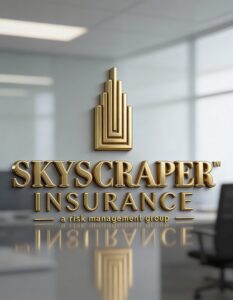Commercial property insurance covers the buildings and property that your business owns or leases and pays for their repair and replacement.
Many businesses own or lease commercial property. Should you suffer a loss, commercial property insurance pays for the repair or replacement of your goods and property, including the structure where you conduct business, furniture, computers, inventory and supplies. Since commercial property insurance coverage is so broad, we’ll help you understand the specifics.
What is commercial property insurance?
Commercial property insurance is a type of business insurance and is often paired with top business liability insurance in your policy. It pays to repair or replace your building and any items owned by your business on business property if they are damaged or lost in a covered claim.
What does commercial property insurance cover?
As with all insurance policies, there are certain events, called perils, that a commercial property insurance policy protects against. While the covered losses may change depending on your provider, these are some of the most common perils that a commercial property insurance policy covers:
- Fire
- Explosions
- Burst pipes
- Windstorm
- Theft
- Vandalism
Bottom line: Commercial property insurance protects your business’s property against perils such as fire, theft, vandalism and explosions. However, this is just one type of business insurance you should have.
Commercial property insurance provides coverage for both real estate and physical objects. The covered items include the following:
- Real estate
- Office furniture
- Office electronics
- Equipment
- Supplies and materials
- Inventory
- Signs and fixtures
Essentially, anything that you physically use for your business is considered business property and would be covered by your policy. You don’t need to itemize your business property to get coverage, although completing an inventory will ensure that you have enough coverage for everything, including office chairs, reams of paper and other supplies.
What does commercial property insurance not cover?
Certain types of losses are not covered by a commercial insurance policy. Common exclusions include damage and loss resulting from a hurricane, earthquake or flood. Coverage for these natural disasters often requires a companion policy to the commercial property policy. Read through your policy to identify any exclusions of coverage.
Also note that a commercial property policy will not protect you from general liability claims or business interruption losses. General liability claims include third-party claims that you are responsible for injury or property damage to others. Business interruption insurance pays for lost revenues if your business is shut down due to a covered claim. A business owners policy or other stand-alone policies will cover these claims.
Why should you consider commercial property insurance?
Every business owner with business property should consider getting a commercial property insurance policy. Without commercial property insurance, you would pay for loss recovery by dipping into the company coffers, taking out a loan, or closing shop. With a commercial property insurance policy, you exchange a monthly or annual premium for the peace of mind that your business assets are protected.
In the long run, insurance can save thousands of dollars. To put these savings in context, take a look at the average costs of some common claims:
- Burglary and theft: $8,000
- Water and freezing damage: $17,000
- Wind and hail damage: $26,000
- Fire: $35,000
Most small business owners don’t have that kind of money sitting around, so it’s important to get a good commercial property insurance policy.
How much does commercial property insurance cost?
Commercial property insurance policy costs depend on many factors. Your premium will increase as you insure more real estate or business assets. If you choose a higher deductible, you can reduce the annual premium, though you should only choose a deductible that you are comfortable paying. The location of your business property will also affect the price, since some neighborhoods are considered riskier than others.
The median price for commercial property insurance is $63 per month, or $755 per year, according to Insureon. That’s based on a value limit of $60,000 and a $1,000 deductible.
FYI: If your small business doesn’t have much personal property, consider purchasing a business owners policy that combines general liability and commercial property insurance. These often save business owners money and cost as little as $500 annually with limited property coverage.
How is your property covered?
Business property covered in a loss is either paid out according to its new-market cost or its depreciated cost. It’s important to understand how your policy is written. For example, a policy based on depreciated cost won’t pay for the price of a new printer. Instead, you’ll get a check for the printer’s value prior to the loss.
When a policy pays the depreciated value, it is known as an actual cash value (ACV) policy. When a policy pays the new-market cost to replace the item, it is called a replacement cost policy. Replacement cost policies are more expensive than actual cash value policies because they will make you whole in a loss. If you can afford it, a replacement cost policy is the better policy.
What if you don’t own the building your business is in?
If you are leasing the building, you’ll still want commercial property insurance. Look through the lease terms to determine exactly how much coverage the landlord requires of you. Many landlords require $1 million in coverage for damage to the property they rent you. This would pay to rebuild the building in the event of a fire or other significant loss. Review your landlord requirements and tenant improvements with your insurance agent to make sure you have enough coverage to protect yourself.
What if you have other people’s property in your possession?
Certain types of businesses frequently have consumer property in their possession as part of standard business operations. Think about a computer repair shop or consignment store, where the business is responsible for the property for a given amount of time. In cases like this, make sure your business has coverage for property in your care.
In many cases, you’ll need an additional policy to cover third-party property. This policy is often referred to as “garage keepers insurance.” Some business owners policies will include some coverage for consumer property in your care. Ask your insurance agent if you are interested in this type of coverage.
Did you know? If your business has consumer property in its possession, you may need a different policy called garage keepers insurance.
How do you get commercial property insurance?
You can purchase a commercial property insurance policy as a stand-alone policy or as part of a business owners policy. Contact a commercial insurance carrier or a broker for a quote. To get an accurate price, you’ll need to have an idea of the value of the business property and other details such as your location and the industry you serve. Once you have a quote that you are satisfied with, the next step is to bind the policy. Binding means that you pay the required premium and the policy is put in force. As soon as you bind a policy, it will cover you against losses.









